Both England and Germany had some struggles in their Euro 2020 group stage games. England had slightly less problematic opponents and won their group despite unconvincing attacking performance.
On the other side, Germany were in the so-called “group of death” and had to battle their way through to the next round playing against the World champions France and the European champions Portugal.
They did eventually qualify for the Round of 16, finishing second in Group F, meaning they were about to meet the leaders of Group D England.
The Three Lions exited the group scoring only two goals, which was quite disappointing having in mind their impressive attacking line-up. Their defensive performance was something to be proud of, though, since they are the only team that didn’t concede a single goal in the group stage. It took Gareth Southgate a few tries to potentially find the best starting XI and increase the team’s efficiency.
Germany on the other side hinted how deadly their attack could be with a 4-2 win over Portugal but also showed defensive vulnerability, conceding in all three games and finishing with one win, one draw and one defeat, which, for a moment, put their qualification to the next round under question.
Both teams have their strengths and weaknesses, and this makes the upcoming fixture one of the most unpredictable ones in the Round of 16. While most people would consider Germany as the favourites to win that battle, England do have some hidden weapons that might take advantage of the opposition’s defensive issues.
This preview in the form of tactical analysis examines both teams’ tactics and how they could expose each other to proceed to the next round.
England
How they could exploit Germany’s vulnerable defence
The midfield line might turn out key both defensively and in attack for England. When in possession they’ll need the midfield support centrally, instead of only focusing their actions in the wide areas and in pushing the full-backs further. Especially if Southgate relies on the 4-3-3 formation with Jack Grealish behind the striker again, the team would need Declan Rice and Kalvin Phillips to really involve in ball progression and in the positional changes that the attacking players are trying to do.
That will give them more freedom and allow the team to overload the opposition half, dragging defenders out of position and creating spaces. These spaces could be easily exploited by Grealish and Harry Kane, but also by Arsenal‘s Bukayo Saka or Manchester City‘s Phil Foden and Raheem Sterling who like to cut inside and provide support in and around the box.
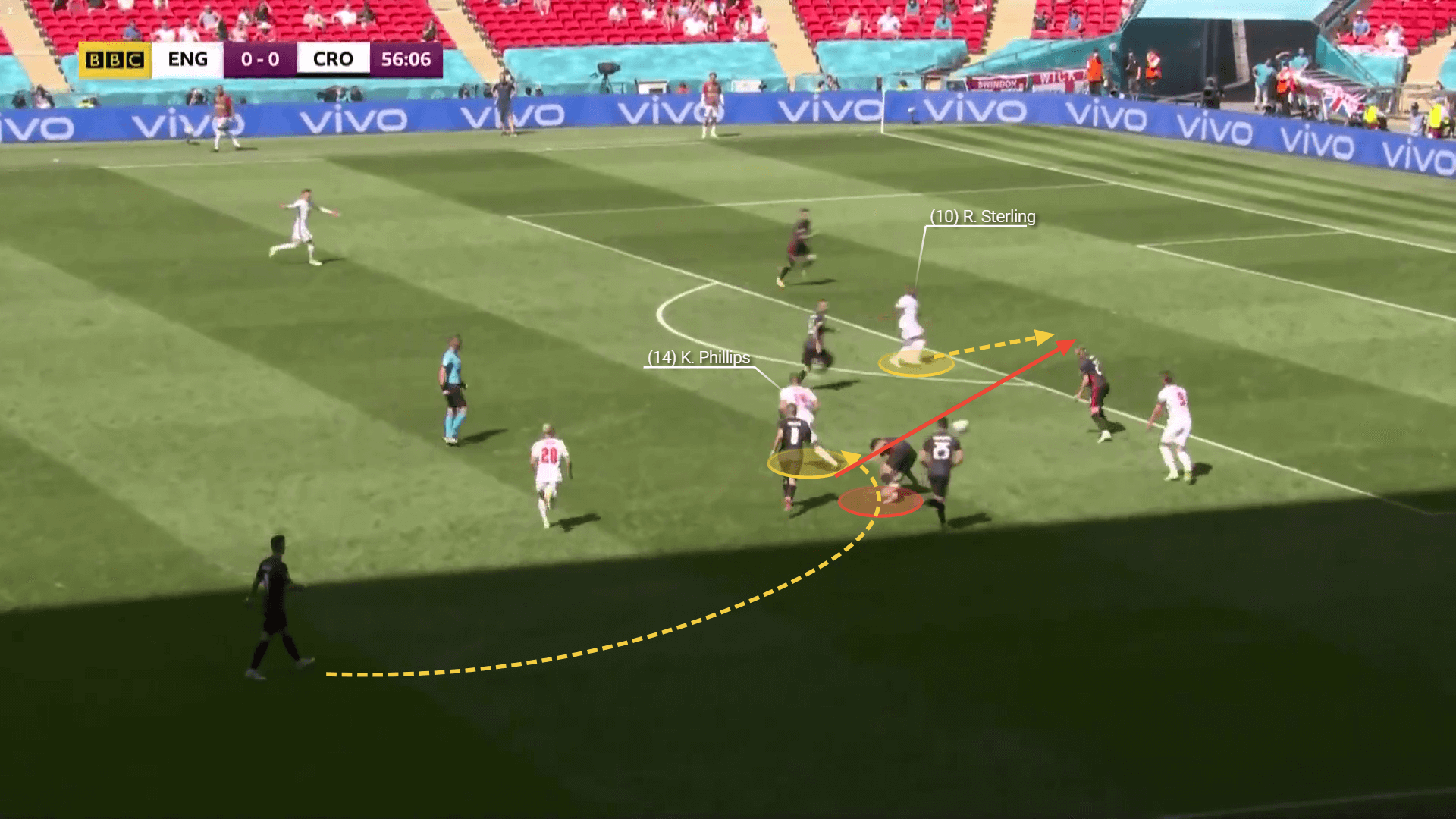
Their half-space presence could be crucial in attack against Germany due to their poor positioning in and around the box, especially when attacked on speed. Dropping additional men into their three-man backline, wouldn’t always work as planned. Phillips was very efficient in his attacking support in England’s opening game against Croatia and his involvement out wide and in the half-spaces troubled the opposition. With Saka eventually starting on the right flank, the team could focus on circulating the ball out there and using his abilities on the ball to cut inside and create goalscoring opportunities.
Even if Germany’s defensive organization is solid, having one of the wing-backs dropped back, and they cannot penetrate as mentioned, building up through the right and retaining possession there could be successful in freeing up the left side of the pitch, so the team could use a switch of play and use Shaw and/or Sterling to expose the opposition.
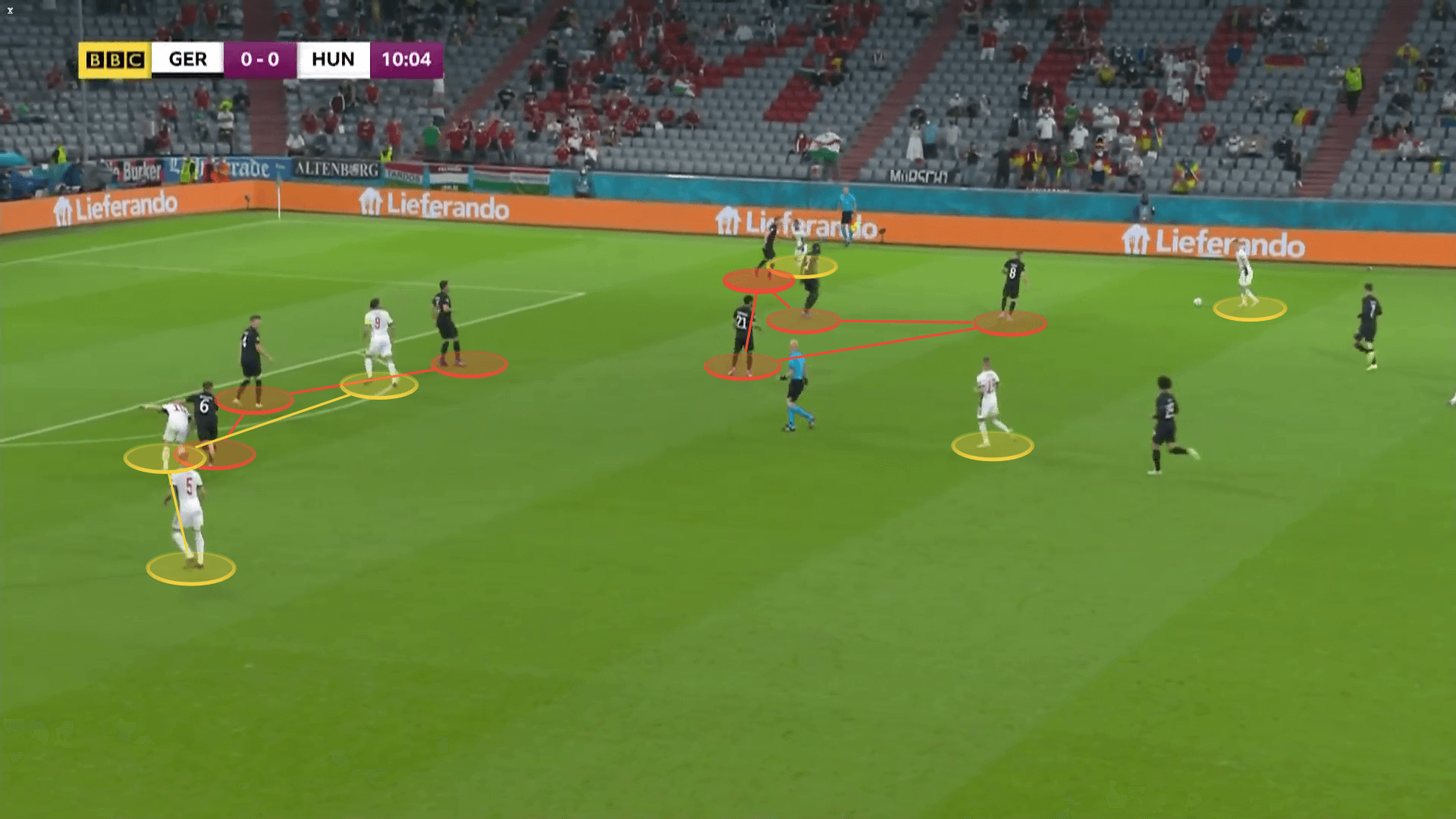
As it is expected that England would have less time on the ball and it will be difficult to control the game, they could also try to create chances on a counter. Germany’s three-man defence are vulnerable when caught on speed, especially with Antonio Rüdiger’s involvement in attacking set-plays. If they invite the pressure in their own half, they could use the speed of Sterling, Grealish and Saka to start counter-attacking actions.
Having Borussia Dortmund‘s Jadon Sancho in the squad could also help them in executing both strategies as his distinguished passing can be used both in the final third and in initiating counters.
How they could hold off Die Mannschaft’s attacking prowess
As mentioned, the midfield would have to step up in defence too. Their support both centrally and out wide would be much needed, especially with Germany’s tendency to attack with width. That’s why using the full-backs responsibly would also be very important since the opposition won’t hesitate to exploit the spaces created by their attacking movement. England’s full-backs will need to increase their defensive awareness but also receive the midfielders’ support both with covering depth and for closing out spaces on the flanks.
While the central pair would be very important too, the wide players would have the biggest responsibility considering Die Mannschaft’s pacey attackers and their reliance on crossing. They should not underestimate Robin Gosens, not only because of his support from out wide but also because of his late runs to the box. This means that even if they do manage to hold them off from open play, they need to have increased awareness when defending set-plays. Germany frequently use a switch of play too, which makes covering Gosens tightly extremely important too.
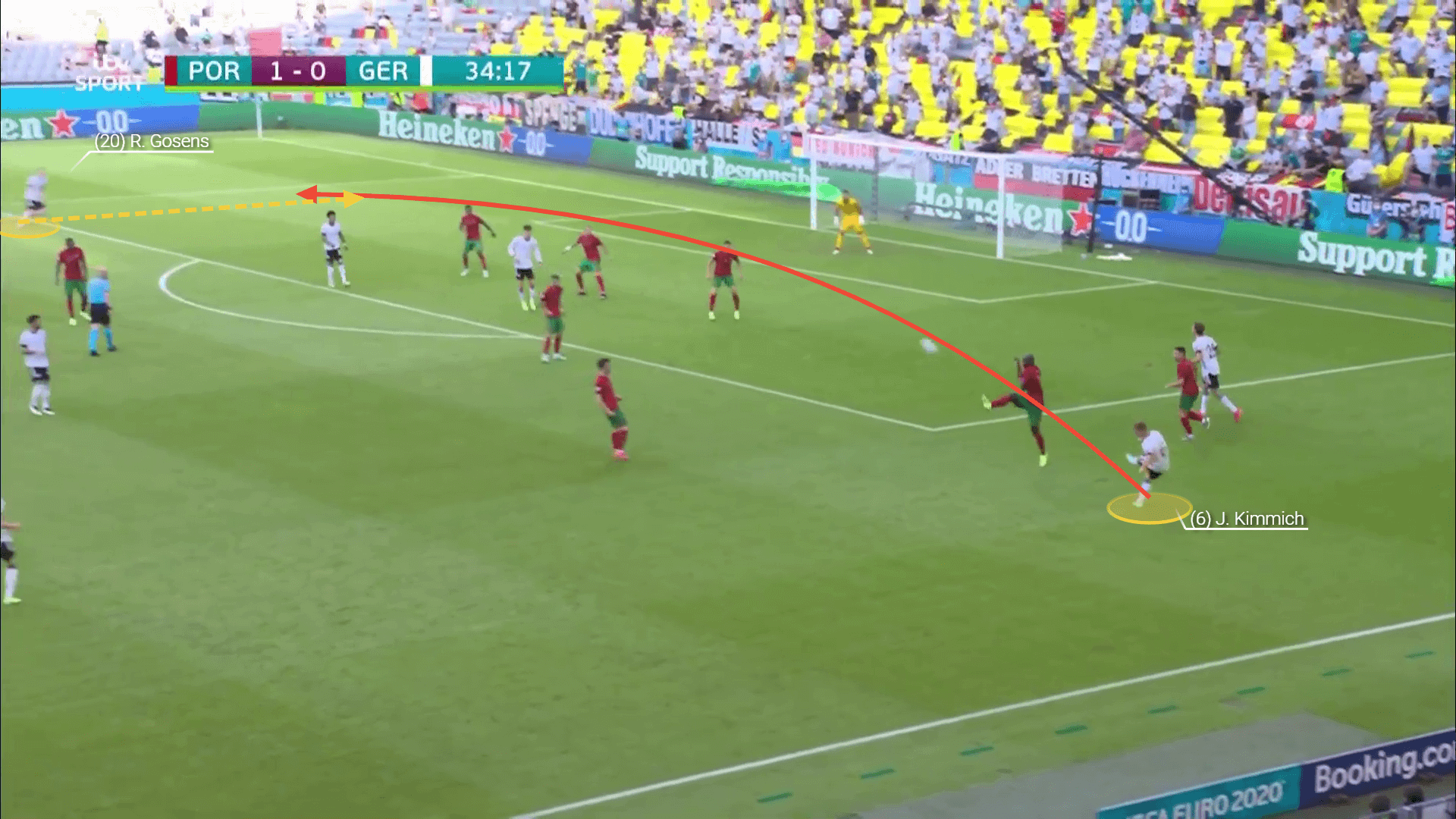
Forcing Germany into attacking through the central areas could decrease their efficiency in front of the goal, but despite that, they should not be underestimated in the presence of Bayern Munich‘s Serge Gnabry who is known for his control. He could easily dribble past defenders or receive long balls and convert them into chances thanks to his ability to hold on to the ball. Neutralising him would secure Jordan Pickford’s goal better.
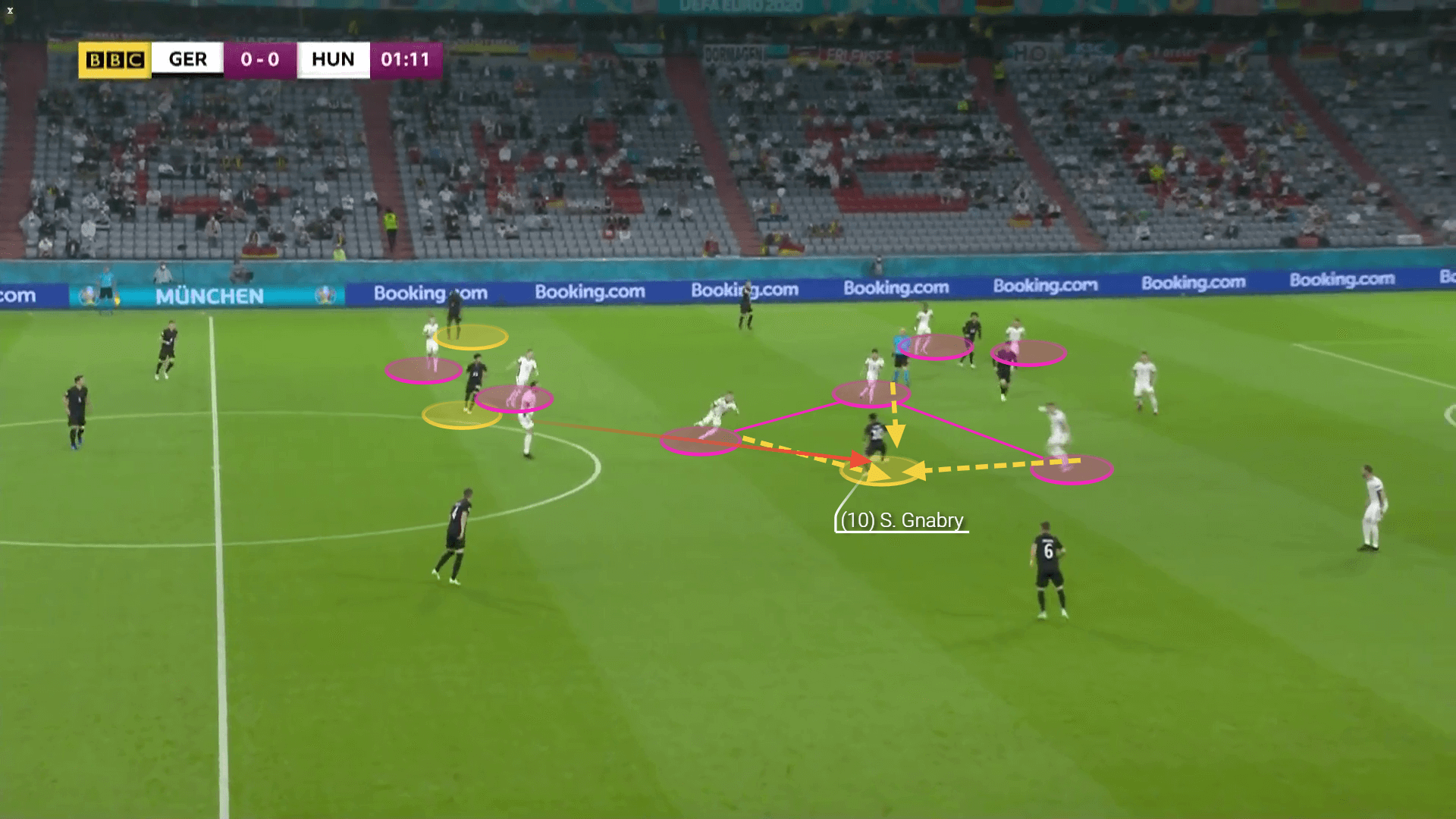
Germany
How they could use England’s defensive confidence against them
As mentioned, England are the only team that are yet to concede a goal in Euro 2020. This is of course mostly a result of their defensive discipline but it’s also a result of their opponents’ attacking inefficiency. They haven’t been tested really, with Scotland troubling their defence the most, although only two of their 10 shots were on target.
The Three Lions haven’t played against a distinguished attack-minded team yet in the competition and Germany’s press might catch them unprepared.
Die Mannschaft are a team that press high and always look to gain back possession as soon as possible. They are always on the front foot and look to recover the ball in the advanced areas, which allows them to catch the opposition off guard and create more chances. Forcing the opposition into individual mistakes and taking advantage of them is crucial for both their successful defensive and attacking actions.
With an average PPDA of 8.97 in the tournament, which went down to 5.36 against Hungary, it is clear that they will look to control the game with a high press intensity. This will put England’s defence to the test.
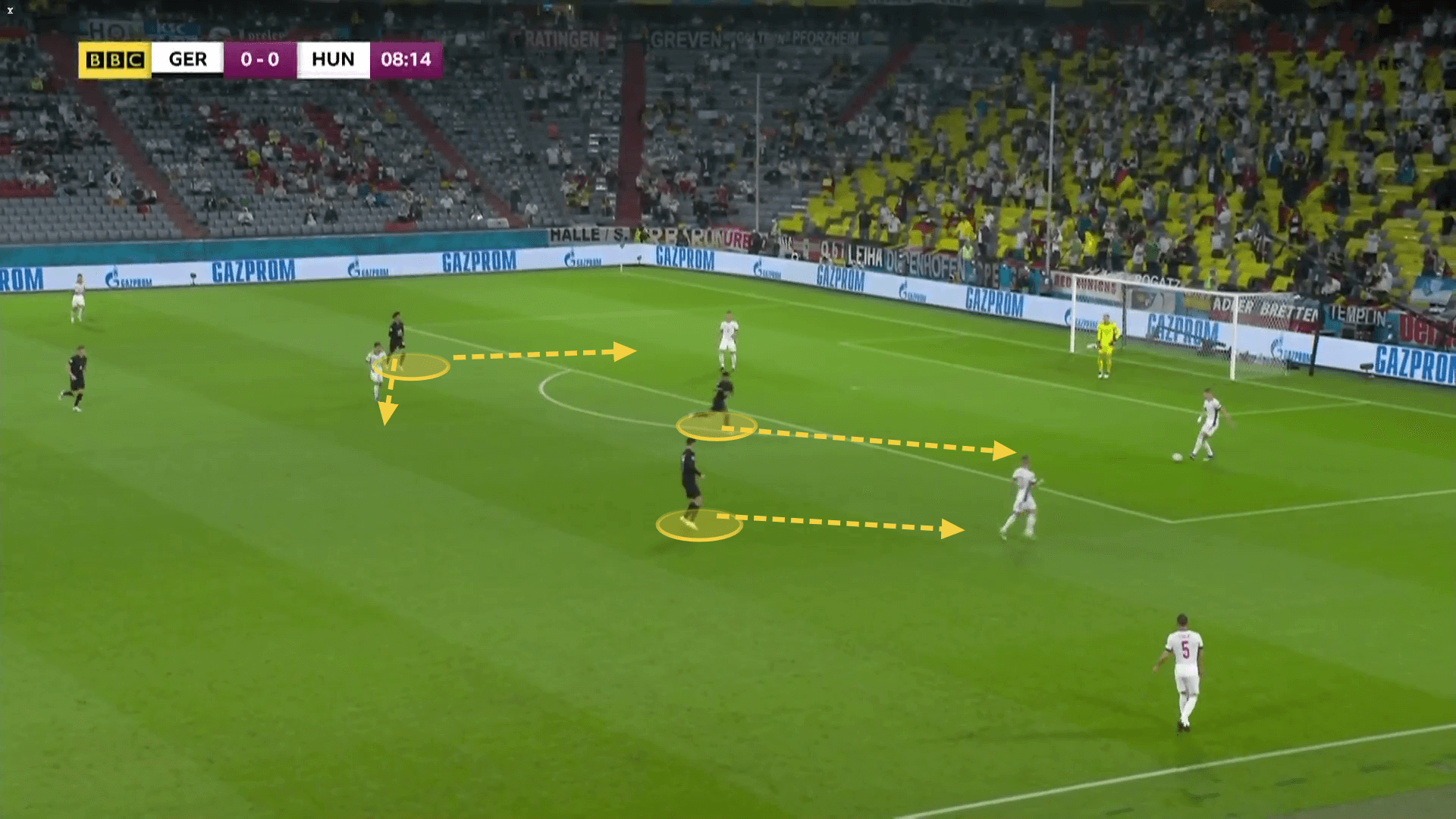
Pressing high and trying to recover the ball and also trying to anticipate their opponents’ actions could be crucial for the team. This strategy could be successful against the Three Lions’ centre pair (eventually Maguire-Stones) who are the main England man for retaining possession and building up from the back. As ball-playing defenders who are crucial for the ball distribution to the advanced areas, pressing them intensely could be the winning ticket for Germany. That will help them defensively in terms of troubling England’s build-up and blocking the passing lanes, but also in attack, by forcing them into mistakes and recovering the ball.
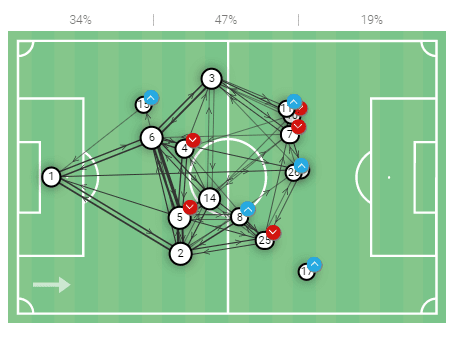
This strategy could be successful against the midfielders too, as England’s coverage of the central areas isn’t very solid. Phillips is the player with the most lost defensive duels in the previous three games, making him an easy target for Joachim Löw’s team.
Another option, of course, is sticking to attacking through the wide areas and exploiting the spaces behind the full-backs. Germany need to assess the situation and if England do involve their full-backs up high in the attacking actions, Löw’s side need to take advantage of their movement.
Conclusion
Both teams have their vulnerabilities and it will be a matter of increased awareness and quick adjustment for them to take advantage of each others’ mistakes. While England have been defensively solid, they will definitely struggle against Germany’s experienced defence. On the other side, Die Mannschaft should not underestimate England’s talent in attack and provide better coverage during transitions, otherwise, they will suffer again defensively.






Comments